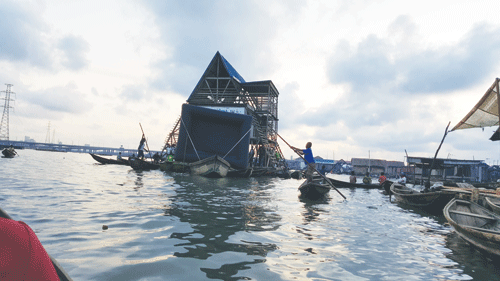By all accounts, the evening of October 9 spent in Makoko, a community on the Lagos lagoon, was as inspiring as it was educative. Those who braved the lagoon waters and jumped into the swaying canoes got much more than they had bargained for. They can now say for a fact that they too had come, seen and conquered the lagoon. It is no wonder that Makoko is abuzz with many a filmmaker, photographer or newsperson from abroad resulting in its making news internationally.
 The evening of October 9 was an opportunity for members of the community and their well-wishers to see the award-winning documentary, Dear Mandela, which is currently touring three Nigerian cities. The South African documentary about how slum-dwellers in Durban won their case against government officials hell-bent on demolishing their community.
The evening of October 9 was an opportunity for members of the community and their well-wishers to see the award-winning documentary, Dear Mandela, which is currently touring three Nigerian cities. The South African documentary about how slum-dwellers in Durban won their case against government officials hell-bent on demolishing their community.
Described variously by critics and reviewers as “stirring…evocatively shot, lucidly edited”; “enthralling”; “gripping” and “a call to action as much as it is an indictment of a government that has lost its way”, the documentary has won multiple awards, including Best South African Documentary at the Durban International Film Festival (DIFF) and a nomination for Best Documentary at the African Academy Awards, screened in 40 countries and translated into 12 languages.
Those who got to see this film against the backdrop of the everyday life in Makoko would no doubt agree that it is a masterpiece. There were also two other short films that were screened that evening. One on Kunle Adeyemi, the architect who conceived and built the Makoko Floating School, where the screening took place and another one about the Chicoco community in Rivers State, Nigeria.
The Nigerian tour is being facilitated with support from Amnesty International Nigeria, The Ford Foundation and CMAP as part of a cultural exchange programme and will screen in Abuja, Port Harcourt and Lagos to raise awareness about housing rights issues and forced evictions as well as their impact on lives, while telling the stories of communities struggling with gross violation of their human rights.
Explaining their involvement, Amnesty International Nigeria’s Housing Rights Researcher, Morayo Adebayo, said: “Our objective at this event is to highlight the human rights issues evoked by forced eviction while sensitising stakeholders on their obligations and rights, through human rights education and discussion sessions.
“Amnesty International is very much concerned about the trend of forced eviction which appears to be spreading across the country at an uncontrollable rate. It is in this light that we have considered it necessary to make the conversation a national one. And this tour, which took off in Mpape, Abuja, on World Habitat Day, Monday October 5, 2015 is one of the means for achieving this objective.”
Directed by Dara Kell and Christopher Nizza, Dear Mandela tracks what happens to three friends who refuse to be moved from their shack in Durban’s vast shanty towns when the South African government makes good its promise to ‘eradicate the slums’ and begins to evict shack dwellers far outside the city.
Dear Mandela follows their journey from their shacks to the highest court in the land as they invoke Nelson Mandela’s example and become leaders in a growing social movement. By turns inspiring, devastating and funny, the film offers a new perspective on the role that young people can play in political change and is a fascinating portrait of a South Africa coming of age.
Special guests include Thembani Ngongoma and Nan-dipha Chala, founding members of the South African shack dwellers movement, Abahlali baseMjondolo, which features prominently in the documentary.
The Port Harcourt screening and concert took place at Bundu Waterside on October 11, 2015.
Abahlali baseMjondolo, also known as AbM or the red shirts, is a shack-dwellers’ movement in South Africa. It is well known for campaigning against evictions and for public housing. The movement grew out of a road blockade organised from the Kennedy Road shack settlement in the city of Durban in early 2005 and is now the largest shack dweller’s organisation in South Africa. AbM campaigns to improve the living conditions of poor people and to democratise society from below.













